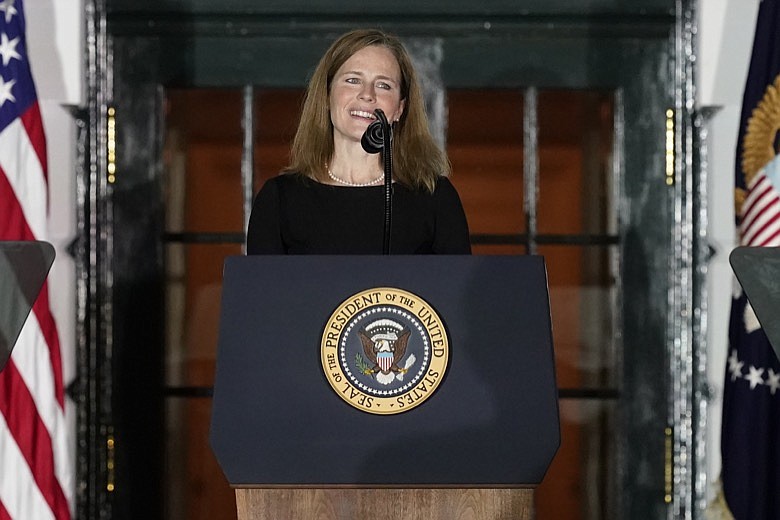The United States Supreme Court had a 6-3 majority of justices appointed by Republican presidents when Roe v. Wade (abortion) was decided in 1973.
The court had a 5-4 majority of justices appointed by Republican presidents when Obergefell v. Hodges (gay marriage) was decided in 2015.
Now consider this:
The court had an 8-1 majority of justices appointed by Democratic presidents when the Dred Scott case was decided in 1857, ensuring that slaves were property and that slave owners could not be deprived of their property without due process.
Let those facts sink in for a moment.
Today, Democrats are predicting the end is near for abortion, gay marriage, the Affordable Care Act, disabled rights, Birkenstocks and Tervis tumblers now that Justice Amy Coney Barrett has been seated as an associate justice on the high court.
They're attempting to fund-raise in the last week before the election - for Democratic presidential candidate Joe Biden and others - on those fears.
But the truth is, even though the court now has a 6-3 majority of judges appointed by Republican presidents, there is no guarantee what will or will not be overturned, which way a case will be decided or what Republican justice will develop a case of Washington-itis.
Veteran observers of all things D.C. swear Washington-itis is a real thing. It is the pseudo disease those elected or appointed develop when their desire to be liked in the heavily Democratic District of Columbia outweighs their promise to constituents or their vows upon being appointed.
Various senators over the years have become infected, and some say Supreme Court Chief Justice John Roberts has the affliction.
In other cases, some justices were never as conservative to begin with as they seemed in the nomination process.
President Dwight Eisenhower once reportedly said, "I have made two mistakes, and they are both sitting on the Supreme Court," and the nomination of Chief Justice Earl Warren was "the biggest damn-fool mistake I ever made."
Two appointees of President Richard Nixon, Harry Blackmun and Lewis Powell, backed countless liberal court decisions, including Roe v. Wade.
John Paul Stevens, the only high court appointment made by Republican President Gerald Ford, became another liberal giant.
President George H.W. Bush, despite serving only one term, appointed two justices, David Souter and Clarence Thomas, now the court's longest serving justice.
Bush, as was his manner, did not criticize Souter, who was on the liberal side of many decisions and prompted the conservative legal movement mantra "No More Souters," but was said to be disappointed in some of his opinions.
Neither of President Donald Trump's appointments, Neil Gorsuch and Brett Kavanaugh, for that matter, have voted down-the-line for what was expected to be the conservative opinion in every case.
Thus, predicting how Barrett will vote, or where she will take the court, is an exercise in futility.
Nevertheless, in brief remarks after taking the oath Monday night, she attempted to make it clear that the Supreme Court is to steer clear of "policy preferences," which, at times, both parties have seemed to desire from their nominees.
"It is the job of a senator to pursue her policy preferences," Barrett said. "In fact, it would be a dereliction of duty for her to put policy goals aside. By contrast, it is the job of a judge to resist her policy preferences. It would be a dereliction of duty for her to give in to them.
"Federal judges don't stand for election, thus they have no basis for claiming that their preferences reflect those of the people," she said. "This separation of duty from political preference is what makes the judiciary distinct among the three branches of government."
Democrats, angry over the timing that constitutionally allowed Trump to appoint a justice to replace the late Justice Ruth Bader Ginsburg, have - in the manner of the playground rather than the halls of Congress - vowed all manner of retribution.
"My colleagues may regret this for a lot longer than they think," said top playground bully Sen. Chuck Schumer, D-New York, the minority leader.
"Will Democrats go to new, extraordinary lengths to maximize their power given the extraordinary lengths Republicans have gone to maximize their power?" said Sen. Chris Murphy, D-Connecticut. "... [W]hat do Republicans expect?"
"We must expand the Supreme Court," Sen. Ed Markey, D-Massachusetts, tweeted.
All of this before Barrett first slipped on her judicial robe, before she heard her first argument, before she issued a vote on her first decision.
As the years go by, she may remain reliably conservative, as Justice Thomas who swore her in at a White House ceremony Monday, or she may develop Washington-itis and confound her backers.
But all the tempest over her nomination and over her being seated on the court sadly only reflects on the lack of temperance of her detractors.
